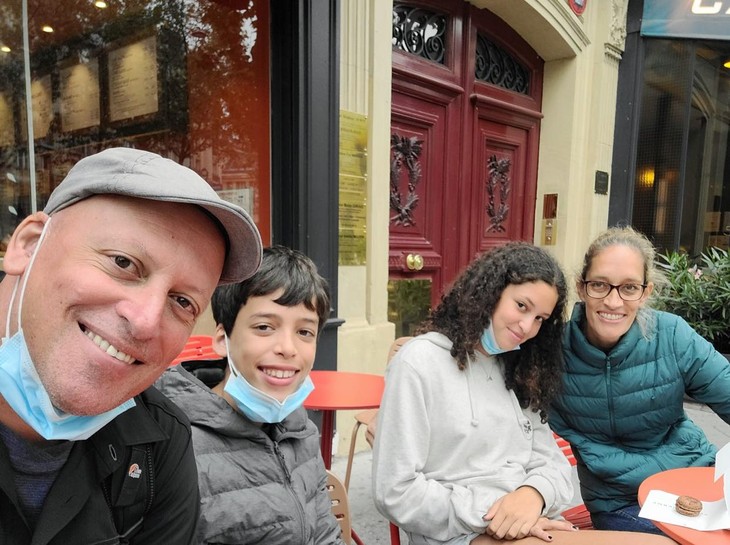(VOVWORLD) - Raising a happy, healthy child is one of the most challenging jobs a parent can have and also one of the most rewarding. Yet many of us don't approach parenting with the same focus we would use for a job. We may act on our instincts or just use the same parenting techniques our own parents used, whether or not these were effective. Is it the same all over the world? This week, I’ll talk with a mother from Israel to find out which methods or principles she and her husband are using to raise their children.
 Roni Reichbard and her family members. (Photo credit: Roni Reichbard) Roni Reichbard and her family members. (Photo credit: Roni Reichbard) |
Bao Tram: Welcome, Roni Reichbard, to VOV’s Cultural Rendezvous! Tell us a bit about yourself.
Roni Reichbard: Hi! My name is Roni Reichbard. I’m almost 46 years old and from Tel Aviv, Israel. I’ve lived in Tel Aviv all my life. I’ve been married for 18 years. We have two children. My older daughter is 15 and a half and my son is just over 12. I’m a patent attorney. I’ve been practicing for about 19 years now.
Bao Tram: Parents wherever they are in the world always wonder about the best way to raise their children. What about you? What child-rearing methods are used by most Israeli parents?
Roni Reichbard: Well, I can speak for myself and our family. I think it's not really a method of educating or parenting, it's more a matter of how you feel things should be done. And the basic values you want your children to have. When I say it’s not a method, I mean I wouldn't want to work according to a plan. It's something that you know how you want your family to be, and how you want your children to be. And that's how you act. You have your values, and you have the way you think things should be done, and the way you want your children to be raised according to your values, your surroundings. So if you want to know the Israeli way of parenting, I would say that, first of all, Israelis are very open. Israeli families are very open. Israelis are known to be very outgoing and very warm people. Of course, you know, people are different, but I'm talking in general. So you wouldn't see harsh discipline, or it’s less common to see harsh discipline in Israeli families, especially in young families. Maybe it was different in the old days. I'm talking about these days. So I can say that in our family, there's a lot of respect for the children. Even though they’re kids and we’re adults, we take notice of what they think and what they want.
Bao Tram: Can you give me a specific example?
Roni Reichbard: I can give you an example. A few years ago, we were considering moving to a different house. That would mean we would leave Tel Aviv for a different city. We discussed this with the kids. At that time, our daughter had started in a new school and she said she couldn’t think of moving away because all of her friends were here and she had settled in with new friends and didn’t want to move away and leave them all behind. We considered everything and decided not to move, because her opinion mattered, even though she was only 13 at the time. We decided we would take her and our son’s thoughts into consideration. What I mean to say is that there are a lot of mistakes made between parents and children. An important value for my husband and me is the way we raise them, and I think it contributes to a good relationship between parents and children when there is mutual consideration and respect.
Bao Tram: I think that parents share a dilemma, which is that they would like their kids to obey them and do whatever they say without arguing, but on the other hand, want to raise independent kids who can do things on their own. How do Israeli parents resolve this dilemma?
Roni Reichbard: I think the best way to approach such a thing is to make sure everyone in the household contributes to our life together. As I said, it’s not a matter of discipline or making them obey, it's a matter of living together and making the environment nice for everyone.
Bao Tram: What is the most difficult thing you face when raising your kids?
Roni Reichbard: Parenting them is not the same as teaching them. I have 2 teenagers. With teenagers the most challenging thing is having a relationship with them where they know they can come to us with anything, because, when you're a teenager, you go to the people who are your friends. I want to know that my kids feel comfortable coming to us with anything – happy things, bad things - and want them to know they can tell us even bad things and nothing bad will happen; the world will not end. We can control our reactions, so the next time they’ll once again feel comfortable coming to us. It's a big challenge because in Israel kids are very independent from an early age. They go out by themselves, especially now that they have phones. That’s both good and bad, but at any rate, it keeps the kids very independent. When you’re a teenager, you feel you know everything and your parents are people who don't understand you and don't know anything. I really hope we have a relationship with our kids where they can come to us and share with us.
 Roni Reichbard, a patent attorney Roni Reichbard, a patent attorneyat Landa Labs, Tel Aviv, Israel.
|
Bao Tram: Education should start at birth. Do you agree?
Roni Reichbard: I totally agree, if by “education” you mean parenting, not teaching. When I think about parenting, I think about setting an example and demonstrating what our values are. My husband and I make decisions together. We are different people, but our parenting style and opinions are very similar because we have similar values. When we need to have a serious talk with our kids, we always do it together. So if you say parenting starts at birth, definitely, because the kids are looking to you all the time.
Bao Tram: From your own experience, have you got any advice or tips to share with Vietnamese parents?
Roni Reichbard: As I said before, especially when your kids are teenagers, you have to respect them. Don't treat them like kids, because it will antagonize them. I think it makes for a good relationship, and then the respect and caring is mutual. I don’t know about Vietnam, but in Israel the kids are very important in the family. Now the whole family must adapt to the kids. In our family there are four people, and all 4 of us have concerns – the kids’ concerns and the parents’ concerns. You should not disregard your needs over your kids’ needs. That’s the advice from my perspective.
Bao Tram: Thank you, Roni Reichbard, for joining us today and sharing with us some parenting perspectives of Israeli parents.
Roni Reichbard: Thank you very much for having me today. I hope I’ve helped your audience understand a little better how things are done in Israel.